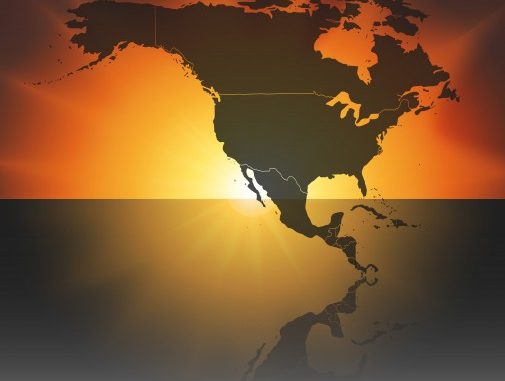
In this edition of North America Watch, we highlight pieces that deal with a range of energy, environmental, immigration, and transportation issues at play in Canada, Mexico and the United States.
This being the start of summer, we also have thrown in a light-hearted report about a ferry that carries people across the Rio Grande. Sometimes, it is refreshing to remember that the world is not always so complex.
*The U.S., Canada and Mexico sent high-level representatives to Merida, Mexico this week to create a working group on climate change and energy issues. As the Canadian Press reports, the group will focus on issues from clean energy technologies to energy efficiencies for businesses and consumers to low-carbon electricity grids.
*Bloomberg Business reports that Canada’s central bank held steady on raising key interest rates. The Bank of Canada kept its key interest rate unchanged and said the economy is recovering from a drop in oil prices. The article details the economic impacts lower oil prices have had on Canada’s economy.
 *The Dallas Morning News reports that Texas legislators wrapping up their 2015 session are sure to invest $800 million in securing the Texas/Mexico border. But they are not likely to approve other immigration legislation, including a bill that would create an interstate compact to enforce federal immigration laws.
*The Dallas Morning News reports that Texas legislators wrapping up their 2015 session are sure to invest $800 million in securing the Texas/Mexico border. But they are not likely to approve other immigration legislation, including a bill that would create an interstate compact to enforce federal immigration laws.
In a Dallas Morning News essay, Texas journalist Richard Parker observed that some of the immigration proposals run counter to the strong, sometimes subtle relationship Texas has had with Mexico. If the state keeps trying to pass such laws, he warned, Texas businesses that benefit from trade with Mexico could suffer.
*The Canadian Press reports on a futuristic robot highway from Canada to Mexico. The highway would serve self-driving trucks and track Route 83, which runs from Texas to North Dakota and on into Manitoba.
Before you dismiss this one with a raised eyebrow, remember few of us would have thought we would one day walk around with phones and read most anything we want on them, including mail.
*Long before robots, there were boats, some of them discordant with modern life. From Valley Central .com in the Lower Rio Grande Valley, we learn about a ferry that still transports people from Texas to the state of Tamaulipas. The hand-drawn wood-and-steel boat carries people and cars across the Rio Grande River seven days a week, for as little as $1.25 per person and $3 per car.
One rider calls it a relic, and it’s hard to disagree with that assessment, But, as we said, sometimes it’s nice to take a step back in time.



